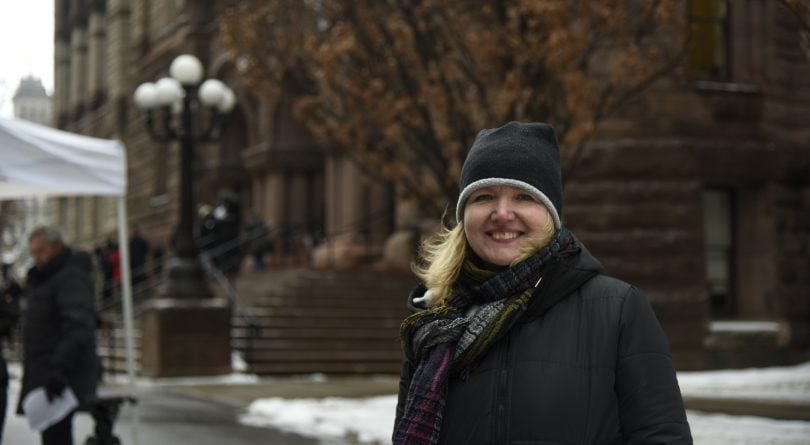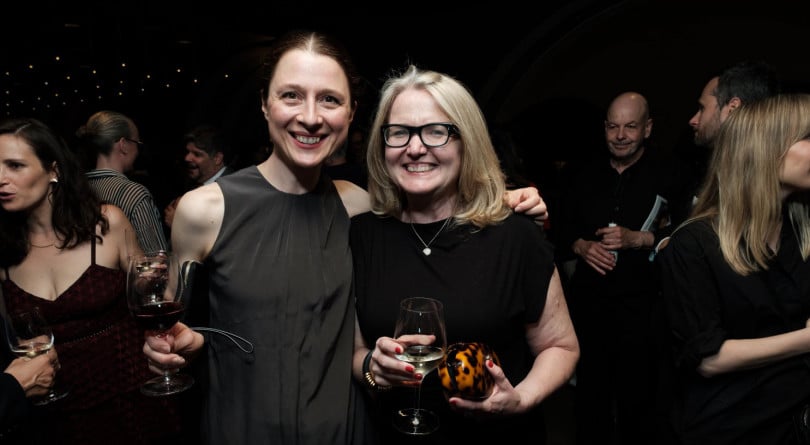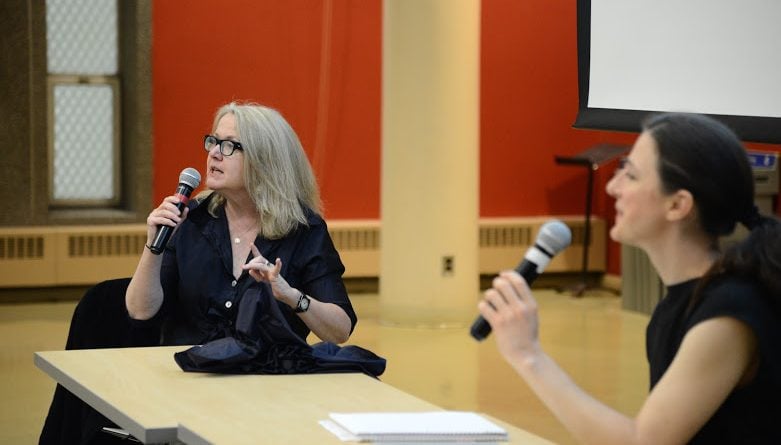Anne Kingston remembered: ‘Passive was not a word she understood’
Colleagues of the award-winning journalist and author remember her immense talent, determination and generosity of spirit

Anne Kingston (Photograph by Maggie Naylor)
Share
Maclean’s senior writer Anne Kingston died this week at 62. We asked some of her colleagues and admirers, in journalism and beyond, to share their memories.
Patricia Treble: “Got a minute?” That’s how Anne always started her conversations with me. She’d plunk herself down in a chair and I’d wait to hear what was on her mind as she teased trends out of the ether of modern society. It was invigorating and humbling—in a newsroom filled with smart people, Anne was in a class of her own.
Anne Marie Owens: Working with Anne on a story was like finding yourself at a dinner party across the table from the most interesting person in the room, talking about the most riveting topics. Anne worked her way through a big story by talking it out. She’d spend ages dissecting every aspect of the issue, running through the arguments of one side and then, a few hours later, popping back into my office to lay out the argument for the other.
Dianna Symonds: To say that she tackled women’s issues gives no sense of the range of her work and only scratches the surface of the hundreds of stories that she wrote, and their impact. She wasn’t a snob about subject matter. The royals were as worthy of a story as a prime minister, and her attitude to the work was the same when reporting on a sex offender or on the effects of a morning sickness pill.
Sarah Boesveld: I watched Anne Kingston at the Jian Ghomeshi trial in Toronto in February, 2016. While most of us were just trying to keep afloat on the legal logistics of the day, Anne wrote about Marie Henein’s shoes and the message Ghomeshi’s legal team was trying to telegraph about power and gender and control. She saw right through its performativity. She saw through a hell of a lot.

Dianne De Fenoyl: I can’t think of another writer who could as brilliantly take a small thing she’d observed (like what people were wearing) and turn it into a clever piece on where society was going.
Elizabeth Semmelhack: The first time face-to-face, experiencing her mind at work, was actually thrilling. We fell into the conversation, thick as thieves, and over the years I was lucky enough to spend time with her grappling with fashion’s role in the constructions of gender and its complicated, or perhaps as Anne might have pointed out, complicating, relationship to power.
Colin Campbell: There was no story too big or too small for Anne. She once wrote a piece about the marital discord caused by arguments over the ‘right’ way to load the dishwasher. In her hands, it was more than just a fun little story; it was a glimpse into a topic “as varied and personal as fingerprints, and every bit as revealing.” I agreed to talk to her for that story, and my wife and I still laugh about it. Like so many other stories, she nailed it.
Michael Barclay: I’ll never forget a 2014 piece she wrote on “the return of pubic hair” in which every copy editors’ nightmare was oddly reversed: in the rare case where the writer actually meant to write “pubic hair,” Anne had typed “public hair.” Best to err on the side of caution, even subconsciously. (It was spotted and corrected.)
De Fenoyl: She’d always already be reading the book you had just heard about and couldn’t wait to get your hands on.
Michael Friscolanti: Although she was a renowned columnist, Anne was a reporter to the core: meticulous in her research, and feverishly obsessive about the few tiny details she hadn’t yet nailed down.
Barclay: She had a habit of conducting major interviews on her cellphone while strolling through the office.
Friscolanti: I will never forget listening to Anne on the phone with someone who didn’t want to give her a straight answer. By the time she hung up, she usually had what she was looking for.
Kevin Donovan: On more than a few occasions I found her on the tenth floor of 393 University Courthouse, digging into mammoth court files, having jostled for a good position at a busy counter, then dealing with an archaic copying system. What emerged from her in the pages of Maclean’s was accurate, concise and beautiful.
Friscolanti: Anne and I spent months working together on an investigative feature about the murders of Barry and Honey Sherman. Late one Friday afternoon, I came across an important box of documents at the Toronto courthouse—and I needed someone to help me photocopy them before the building closed for the weekend. Without hesitation, Anne jumped in a cab to the registry office, then spent the next 45 minutes frantically photocopying until security kicked us out. That was Anne: anything for the story.
Treble: Her exhaustive research was legendary—she’d be tracking down new angles of a story when she should be writing.

Symonds: Anne never had a deadline that she was prepared to live by. She functioned in an alternate time zone. When she was “close” to filing a major story (reality: 2 to 3 hours away, press time looming), she’d tell you in an almost soothing voice that she was just redoing the last section or giving the story one more read.
Barclay: I won’t lie: Anne Kingston kept me up at night. Quite literally: I was on the copy desk at Maclean’s, which made me one of the people who had to stick around to the bitter end of production every week, and Anne was routinely the last person to file her story.
Symonds: When she was not even close to finished, she would say that the Internet had gone down. That her cellphone had died and that she had missed your call. Or that her car had been towed and she’d be at the office soon. (Probable: the interior of that car was littered with parking tickets. Reality: the story was 4 to 6-plus hours away from landing.)
Barclay: That story wasn’t usually just a column, or a one-pager: it was often a multi-page investigation or in-depth sociological essay. All of which meant that I was often still at work at 1 a.m., waiting for Anne’s copy to hit my desk.
De Fenoyl: When I edited her, she drove me crazy sometimes because she always pushed her deadline as far as she could and then just when I’d think we’d never make it, she’d give it to me and it would be perfect and elegant.
Symonds: Anne never sat back while anyone edited one of her stories. Passive was not a word she understood. She edited at the same time as her editor. She’d argue. She’d say the word change was wrong. She added new material behind her editor’s back. She resisted making any connection that she didn’t see. That’s what made her such a great reporter and writer. She had to know that the story conveyed what she wanted it to say. That those multiple connections rang true.
Barclay: Anne’s stories were always worth the late nights. She wrote powerful investigative pieces. She wrote with great empathy. Her feminist lens was always sharply focused and essential reading. Like any great writer, she could do it all: the heavy weepers as well as the light and fluffy.

Symonds: Anne never met a deadline, but she would arrive in the office looking so elegant. Oh, she might be flustered about the car, but she would almost float in. If it was summer, she was dressed in linen. Her hair straightened. She was wearing a delightful pair of new shoes. She appeared relaxed. She might apologize. She might not. She’d ask, how were we doing with the story? It was equal parts infuriating and exhilarating to work as her editor, but it was impossible to remain angry. Her stories were that good. They are that good.
Martin Patriquin: We were at the National Magazine Awards one year, we were both pissed off at the cash bar and the ticket system it entailed. It was like ordering drinks from the IRS. We were also both pissed.
We got kind of obsessed with a gold-plated sign affixed to the wall outside the toilets that read “bathrooms by Kohler.” (OK I got obsessed.) We decided that a) we needed payback for the cash bar atrocity; b) that it was a further crime that Nick Kohler wasn’t nominated for anything that year; and c) Nick deserves an award. So Anne and I devised a plan. I went at the sign. She stood outside the bathroom on lookout, trying to make it seem that the bald, grunting idiot behind her didn’t exist. She just distracted everyone by being Anne Kingston—that smile, the blond bangs, that tiny eye flick she did, the massive glass of wine in her hand. She was so good at acting scandalized; when I finally got the sign off the wall, she conspicuously refused to acknowledge or even touch it.
Charlie Gillis: Anne had excellent taste in food and wine. When she was covering Bill Cosby’s trial, which was being held in an exurb of Philadelphia on the preposterous belief they could find jurors there whose perceptions of the case hadn’t been tainted by media coverage, the only accommodation we could find for Anne was B-grade chain hotel a half-hour’s drive from the Norristown courthouse. After the first day of testimony, I called and had barely asked how she was when she said, “Terrible! I’m in a goddamn food desert, Charlie!” It became our little standing joke—a metaphor for the whole fiasco of that trial. She would sit through a day of evidence describing Cosby’s appalling behaviour, then hunker down at a McDonald’s and write an excellent column making manifest Cosby’s guilt even as his defence team succeeded in putting his victims on trial.
Boesveld: That was the first real trial of the “#MeToo” era. She was watching closely. Documenting. Observing. Helping us understand.
Gillis: There simply wasn’t the time for her to go and find a proper meal. So naturally, the first thing I’d ask when I got her on the phone is what she’d eaten that day. The answer would be “Water!” Or “f—king Taco Bell!” Anne Kingston would go hungry and thirsty and deprive herself of sleep in pursuit of a story that mattered deeply to her. She swore up and down that when that trial was over she’d go and treat herself to a nice dinner. But when Cosby walked out of that courtroom thanks to a hung jury, I don’t think she could bring herself to do it. Instead, she flew home weary and deflated and 500 per cent determined to see the man tried again. Because she knew the truth would win out. And in the end, it did.
Jessica Johnson: When the University of Toronto wanted to launch a class called “#MeToo and the Media,” we decided to teach it together. Anne’s lectures had the breadth and depth of someone who’d written about the cultural and social issues behind the #MeToo movement for years, and had done courtroom reporting on the trials of Bill Cosby and Jian Ghomeshi. Ever critical, she remembered names and dates of trials and events years after they occurred with an accuracy that is frightening. A lecture she taught on the Clarence Thomas and Anita Hill scandal was as rich with detail as if it happened yesterday.
Boesveld: It’s fitting to me that one of Anne’s last investigative projects was a deep dive into intimate partner violence in this country and all the ways the systems have failed women. One of her last columns called out the passive way we talk about violence against women.
Johnson: She wanted to hold each detail to the light as if it were a gemstone and make sure it was flawless from every angle. The night before our syllabus was due, she wanted to go back to the first few classes I thought we had settled months ago and make sure they were sound; I, yet another journalist with a crazy day job, tried to force her along. “We have to get this done.” She challenged the dynamic and said, “You are not the editor and I am not the writer.” She also hissed, “This is not a good look on you.” Although this is not usually in my character, I didn’t know how else to deal with Anne, so I hung up on her.
Friscolanti: Anne was tough—on flacks, on fools, and sometimes on colleagues.
Johnson: The next day, everything was back to normal. We were both embarrassed and, in the grand tradition of the newsroom, it wasn’t mentioned until after the deadline passed. Then Anne made sure to have me for dinner and make sure we were okay. She was a great cook and, as you can imagine, everything was comme il faut.
Friscolanti: She outworked everyone. But she would never hesitate to help another reporter who wanted to pick her brain. She always had time for that.
Johnson: I was often shocked at the dichotomies in this woman: a feminist who loved to look beautiful, a socialist who loved white Burgundy. Our friendship developed when I moved to the same neighbourhood she lived in, and our lives connected in weekly yoga classes, over coffee at Boxcar Social.
Patriquin: Purely for reaction, I used to call her “Rosedale” because of an old Frank magazine item about her that involved the location of her house. Right now, I can hear her telling me that she lived in ‘Rosedale adjacent not fucking Rosedale,’ like I can see that flick of her eyes. She is one of maybe three human beings whom I would visit or call just to hear them complain, because it was so bloody funny.
Zosia Bielski: Beyond the work, she was a rare journalist who led a rich, full life—reading, travelling and eating well. She had the best taste—in everything. She cooked beautiful food in her beautiful home, the trains rumbling past, shaking her kitchen. I loved her caustic, knowing looks over a (good) bottle of wine.
Johnson: Ours was the easy friendship of women bonding over feminism and $200 leggings. She saw the irony in this. Anne saw the irony in everything. Finding irony was one of her favourite past-times, along with finding the flaw in someone else’s argument.

Bielski: I was always deeply humbled when Anne would suggest we get a drink or go for dinner. She is the most fiercely intelligent woman I’ve ever encountered, and sitting across a table from Anne could feel daunting. Those insecurities would quickly subside: she was a generous mentor, championing other journalists at work and offering real empathy in life.
Johnson: Her reporting on sexual assault and violence against women is some of the most important journalism in this country of the past decade, not just because she covered the facts with accuracy and integrity—she did—but because she showed feminism and its latest incarnations as part of a much farther-reaching struggle for equality between men and women.
Symonds: Anne never knew the meaning of the word never. She was a fierce reporter. She had questions and she wanted answers. She sent me an email a few weeks ago.
“I had my first chemo last Friday and, so far, so good in terms of aftereffects—nothing horrific. I’m spending my days resting mostly. Would love to know what’s going on with you—what you’re doing, what you’re reading, any gossip, any news of the wider world out there.
xo, Anne”
Her mind hungry for news. Her writing precise. Who inserts a comma after an x and an o? Someone striving to get all the details right. Only Anne.
Patricia Treble is the former chief of research for Maclean’s, now a royal watcher with Write Royalty. Anne Marie Owens is a former deputy editor at Maclean’s and former editor-in-chief at the National Post. Dianna Symonds is a former managing editor at Maclean’s and former editor-in-chief at Saturday Night magazine. Sarah Boesveld is a former reporter with the National Post and Chatelaine. Dianne De Fenoyl is a former managing editor at Maclean’s, now with the Toronto Star. Elizabeth Semmelhack is the creative director and senior curator at the Bata Shoe Museum in Toronto. Colin Campbell is deputy editor at Maclean’s. Michael Barclay is former copy editor at Maclean’s, now an author and city columnist at the West End Phoenix. Adrian Humphries is a reporter at the National Post. Michael Friscolanti is a former reporter at the National Post and Maclean’s. Kevin Donovan is the chief investigative reporter at the Toronto Star. Martin Patriquin is a former Quebec correspondent for Maclean’s, now Quebec correspondent with The Logic. Charlie Gillis is a former National Post reporter, now managing editor at Maclean’s. Jessica Johnson is executive editor and creative director at The Walrus. Zosia Bielski is a reporter at The Globe and Mail.